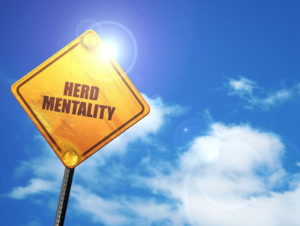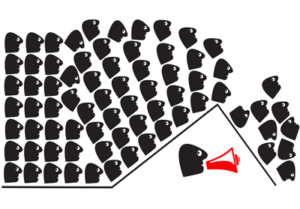 When it comes to betting, we are all often guilty of following the herd. If we learn that a horse’s odds have started to come in because so many people are betting on it, there’s a good chance that we’ll place a bet on it too. The fact that we’ve done our research and the horse in question was never one that we looked at as winning a particular race is irrelevant, we can’t help feeling as though we’ll be missing out if we don’t bet on it.
When it comes to betting, we are all often guilty of following the herd. If we learn that a horse’s odds have started to come in because so many people are betting on it, there’s a good chance that we’ll place a bet on it too. The fact that we’ve done our research and the horse in question was never one that we looked at as winning a particular race is irrelevant, we can’t help feeling as though we’ll be missing out if we don’t bet on it.
It is not just bettors that are guilty of falling for the herd mentality, with financial markets often affected for the same reason. It is a common problem, but one that you need to work hard to avoid falling foul of if you want to stand the best chance of winning money with your betting. We all desire to fit into group dynamics, but this can lead to incorrect decisions being made, which is why we need to avoid it.
Herd Mentality Explained
 Whether you refer to it as the gang mentality, a pack mentality, mob mentality or the bandwagon effect, it all means the same thing: doing something because everyone else seems to be doing it. How many times have you heard stories about people joining a queue just because one was forming and they didn’t want to miss out, even though they had no idea what was going on at the front of the queue?
Whether you refer to it as the gang mentality, a pack mentality, mob mentality or the bandwagon effect, it all means the same thing: doing something because everyone else seems to be doing it. How many times have you heard stories about people joining a queue just because one was forming and they didn’t want to miss out, even though they had no idea what was going on at the front of the queue?
Indeed, some retail stores will often limit the number of people allowed into their shops in order to have a queue form outside and create interest in what they’re selling. Fear Of Missing Out, or FOMO as it is known to millennials, is a real thing, causing people to do all sorts of strange things. Whether we’re afraid that we’ll miss out on something or we’re desperate to conform, it’s a common decision to follow what everyone else is doing, regardless of the rationality of that.
Following what the herd is doing usually causes us to do something that we wouldn’t normally do if we were on our own. It doesn’t require someone to be leading the group in order for herd mentality to apply, so there is not any centralised direction necessarily. Instead, the decision making is happening organically and without direction, resulting in people doing the same thing as each other without any idea of why they are doing so.
The Psychology Of The Herd Mentality
 In the world of cognitive biases, there’s a strong argument that herd mentality is the most hardwired of them all. Humans, like animals, tend to respond to what the pack is doing, even if it results in them getting up to something that they usually wouldn’t. When it comes to how the psychology of the herd mentality works, we’ve got Solomon Asch and his Conformity Experiment to thank for our understanding of it.
In the world of cognitive biases, there’s a strong argument that herd mentality is the most hardwired of them all. Humans, like animals, tend to respond to what the pack is doing, even if it results in them getting up to something that they usually wouldn’t. When it comes to how the psychology of the herd mentality works, we’ve got Solomon Asch and his Conformity Experiment to thank for our understanding of it.
A previous experiment had been carried out by a Turkish American called Muzafer Sherif in 1935, but Asch felt like there was no correct answer to the ambiguous experiment that Sherif had set up and therefore no conclusive proof about a person’s conformity or otherwise. As a result, Asch came up with a social psychology experiment that is now considered to be a classic of its genre, carrying it out in 1951.
Participants were asked to complete a line judgement task that had an obviously correct answer, but used stooges to agree on an incorrect answer. If the participant also gave the incorrect answer then it was clear that they had been pressured to do so by the group. The group, which comprised of one innocent participant and seven stooges, was shown three lines and asked which one matched with the target line.
The genuine participant was placed at the end of the row and therefore gave their answer last. Asch carried out the experiment 18 times and the stooges gave the incorrect answer on 12 occasions. Asch discovered that the participant went along with the majority view in about 32% of the situations they were placed in, with about 75% of participants conforming at least one and 25% never conforming.
Asch also ran a control experiment in which there were no stooges and only real participants, during which time less than 1% of the people taking part gave the incorrect answer. After the experiment, the people that had conformed with the group said that they didn’t really believe the answer they’d given but had been afraid of being ridiculed or thought of as being ‘peculiar’ if they’d given the correct answer.
In essence, people will tend to conform for one of two reasons. Either they want to fit in with the group and not stand out from the crowd, or else they feel as though the group is better informed than they are and therefore they’d be making a mistake to go against the group. Asch changed the procedure in future experiments and found that the size of the group as well as the presence of an ally changed the results.
Why We Follow The Herd
 The desire to fit in is one of the most overpowering desires around. You only need to look at how a far-right party such as the Nazis came to power to see that people will bury their heads over virtually anything as long as it allows them to fit in with the group. Most people desire a sense of belonging, feeling as though the more people do something the more likely it is that they’re going to be correct.
The desire to fit in is one of the most overpowering desires around. You only need to look at how a far-right party such as the Nazis came to power to see that people will bury their heads over virtually anything as long as it allows them to fit in with the group. Most people desire a sense of belonging, feeling as though the more people do something the more likely it is that they’re going to be correct.
It’s also human nature to believe as though others might know something that we don’t. The idea that others are privy to a secret that we aren’t is a powerful one, with these fears able to override our own well-founded and long-standing feelings on an issue. Human beings are naturally sociable and want to be accepted by the group, rather than labelled an outcast by the others involved in a situation.
You can often see people trying to fit into a group when they mimic the language and physicality of others, even though that is not how they naturally talk or behave. We follow the herd because they outnumber us, they might know something that we don’t and because the more people that do something, the more likely it is that they’re doing it because it is the right thing to do and we don’t want to be wrong.
The Financial Examples Of Herd Mentality

As mentioned in the introduction, the herd mentality can have a big impact on financial markets. Indeed, if you look to any of the three most recent financial crises then you can see the herd mentality playing out and leading to disaster. In 2001, for example, the dot-com bubble burst when investors put more and more money into the newly-born internet, doing so because they saw others doing the same and didn’t want to miss out.
Fast forward seven years and you can see a similar thing playing out with the banking crisis, when the growth of the market and the eventual collapse came about because bankers were copying each other in terms of over-investing. Another zoom forward to the Bitcoin explosion shows more of the same happening, with the doubts of investors assuaged by the more confident backers, who would see other people buying as a reason to invest even more themselves.
In each case, the self-perpetuating bubble kept the markets growing until the bubbles finally burst, with many people that had invested huge sums of money suddenly finding themselves penniless. Even the controversy surrounding the Football Index collapse can be seen to owe something to herd mentality, resulting in many people ending up in huge amounts of debt simply because they trusted the herd.
How Herd Mentality Affects Sports Betting
 Most people that place bets on sporting events have an idea of how they think the event in question will pan out. Yet because the herd mentality is one of the most prevalent cognitive biases around, we can often be persuaded to change our bets based on what other people are betting on. As bettors, our aim is simply to avoid as many losses as possible and grow our bankroll to the largest size that it can possibly be.
Most people that place bets on sporting events have an idea of how they think the event in question will pan out. Yet because the herd mentality is one of the most prevalent cognitive biases around, we can often be persuaded to change our bets based on what other people are betting on. As bettors, our aim is simply to avoid as many losses as possible and grow our bankroll to the largest size that it can possibly be.
The problem is that not everyone has the ability to avoid falling foul of various cognitive biases and know exactly how to stick to the fundamentals of sports betting. As a result, many punters can be caught up in copying the behaviour of others, either because they’ve signed up for a tips email, have read what others are up to on a forum or have simply watched the odds for a particular outcome change and decided they want in.
It is most common for the herd mentality to rule on occasions when people don’t know much about what they’re talking about. The less you feel that you know about a subject, the more likely it is that you’ll conform to what everyone else is doing on the matter. Sadly, following the herd in betting will often lead to you ending up in the red, even if the people that you’re copying purport to be extremely knowledgeable on the subject.
Following Others Often Means Poor Value
 Sports odds are based partly on data such as previous form and this means odds roughly reflect real probabilities on average (minus the bookies margin). Prices are, however, also determined by the amount of bets placed on a specific outcome. This means if lots of people back the same outcome then the odds will shorten and the opposing odds will lengthen. In this scenario the market everyone is backing ends up being poor value and going against the grain ends up having a higher value.
Sports odds are based partly on data such as previous form and this means odds roughly reflect real probabilities on average (minus the bookies margin). Prices are, however, also determined by the amount of bets placed on a specific outcome. This means if lots of people back the same outcome then the odds will shorten and the opposing odds will lengthen. In this scenario the market everyone is backing ends up being poor value and going against the grain ends up having a higher value.
Let’s take the Grand National as an example. Only around 15% of favourites in the big race, meaning the odds are around 6.66/1 on average of the favourite winning. Despite this the favourite can often be backed down to odds of less than 6.66/1 and this is largely driven by herd mentality. Everyone begins to back the favourite because others are even though in the end it could be more valuable to back less popular horses.
Over a long period always going with the favourite or the herd will generally mean you end up losing. Savvy bettors will often try to back the opposite outcome to the herd on the basis that the odds can end up being better than real probability suggests, meaning when they do win they win more than they should do by chance alone. Over time this can result in profits rather than loses.
Avoiding Falling Foul Of The Herd Mentality
 It is not always easy to stop yourself from falling foul of the herd mentality. Sometimes you might not even be aware that you’re doing it and self-reflection can only take you so far. Even so, the most important question you need to ask yourself every time you place a bet is whether you have reached the conclusion that it will be a winning bet all on your own. That isn’t to say that you can’t look for or take advice, but how does that advice match up to your own research?
It is not always easy to stop yourself from falling foul of the herd mentality. Sometimes you might not even be aware that you’re doing it and self-reflection can only take you so far. Even so, the most important question you need to ask yourself every time you place a bet is whether you have reached the conclusion that it will be a winning bet all on your own. That isn’t to say that you can’t look for or take advice, but how does that advice match up to your own research?
Read any articles on this site and you’ll soon see that the major watchword that we believe in is ‘research’. Let’s imagine that you’ve got yourself immersed in the world of a particular football club’s followers on social media and have learned that their star striker is going to miss the next game because their wife is due to give birth. You can read tips articles all you want, but if they don’t have that knowledge then they’re likely to tip the team in question on false information.
Your research has led you to believe that the opposition stands a better chance of winning because of the missing star striker. When you look to place your bet, you realise that everyone else seems to be betting on the team as if their striker will be playing. Do you trust the crowd or follow your own research? That’s when you need to ask yourself the right questions to avoid falling foul of the herd mentality.
Those that don’t do a huge amount of research will be more likely to follow what the mainstream media says and that, in truth, is the majority of people. This can lead to certain wagers being hugely overvalued, which you can take advantage of by actively refusing to follow the herd. The manner in which bookmakers attempt to entice bettors to the wager that they’re not placing is how you can find great value in a certain market.
One of the big things to remember is that bad teams or players can still present you with decent bets from time to time. In American football, for example, the Buffalo Bills lost nearly twice as many games as they won during the 2018-2019 campaign, but they were still one of the most profitable teams to bet on because of the amount of games that bookmakers undervalued them in, presenting clever bettors with excellent value.
Ultimately, your own research into a match or game will present you with far better information than the herd mentality ever could. The truth about British people is that we love gambling, but we’re really not that good at it. It is for that reason that you’re better off avoiding following the crowd wherever possible and instead sticking to our mantra of research, research, research.
